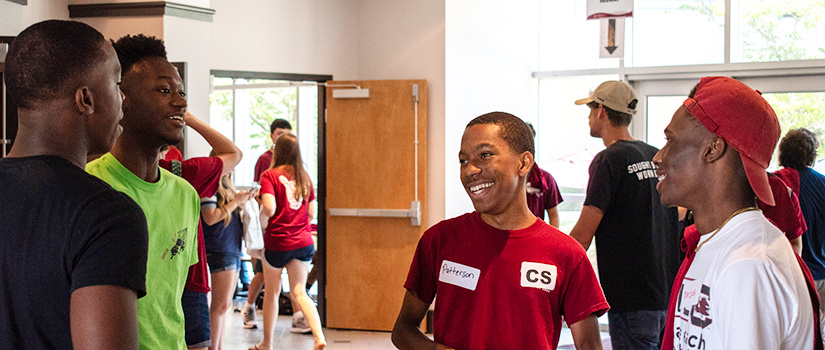By Abe Danaher | May 5, 2020
For Lauren Speck, the college decision was easy. One step onto the luscious green grass of the Horseshoe was all it took for her to decide that the University of South Carolina was the perfect place to call home for the next four years. Actually coming to the university, though? Now that was a different story.
She was nervous. Having grown up in New Jersey, the thought of moving 900 miles away from her family and friends to a city where she didn’t know a soul was a little overwhelming. And as freshman orientation neared, her fears only got worse. How homesick was she going to get? How was she going to do this? Was she really ready?
Then, at her orientation to the UofSC College of Engineering and Computing, she saw a presentation slide titled “Peer Mentorship Program,” with a number written below to sign up. On a whim, she shot a text to the number, having been involved with a mentorship program in high school.
In the moment, she didn’t think much of it. Little did she know that the peer mentorship program she’d just signed up for was going to shape her entire first-year experience: introducing her to her first friend at UofSC, Sydney Wheeler, and making all of her worries disappear before the first day of college.
“From before the first day, I had someone who really understood where I was coming from because she has been through the same things,” Speck says now, a year later. “So, I think it immediately helped. Sydney was one of my first friends on campus.”
In its first year, the Peer Mentorship Program at the college paired 203 incoming freshmen with 186 older CEC students. At least once a month the mentors and mentees met to discuss social, academic and career-oriented topics.
“Just having those conversations all the time and just having that friend – I know it made a huge difference in my first semester.”
- Lauren Speck, Freshman, Biomedical Engineering
For Speck and Wheeler, these monthly meetings became much more frequent. The two often grabbed lunch together, studied together, and even became friends with each other’s friends. A goal of the program was to pair students with similar interests, and they were no exception: Wheeler was also a biomedical engineering major from New Jersey. This allowed her to understand exactly what Speck was feeling being so far from home, and to offer advice on which classes to register for, what professors to take, and which organizations to consider joining.
“She really helped me and provided a lot of insight really early on for me, and I think that was invaluable,” Speck says. “Just having those conversations all the time and just having that friend – I know it made a huge difference in my first semester.”
Speck’s experience is exactly why Hossein Haj-Hariri, the CEC's dean, and Jed Lyons, the CEC's senior associate dean for academic affairs, put such a heavy emphasis on beginning the peer mentorship program. It’s also exactly what the college’s Inclusive Programs Coordinator Brian McCaster had in mind when he first designed the program last year.
“I think the program makes it real,” McCaster says. “Outside of what their parents told them to expect, outside of what their older siblings told them to expect. I think it also establishes a rapport with the college that wasn’t there before."
Senior Computer Science student Kevin Gagnon saw the impact the program had on his two mentees, despite them coming into the college with very different levels of computing experience.
“I was able to help on both spectrums of a future computer science student,” says Gagnon, who received UofSC’s top undergraduate award this spring. “One of my mentees had already done research on computing, taken computing classes in high school, and was really familiar with it. Another had no background at all. And I could push the one that had experience toward research and give him opportunities. And then the person who didn’t know as much, I was able to tutor and help solidify some foundational concepts that were tricky for me when I was starting, too. Just really being able to make their freshman year as strong as possible was really rewarding.”
For Speck, the great impact the peer mentorship program had on her first year in the CEC made her sign up to be a mentor this coming year. After making a new friend in Wheeler and learning all about internship and research opportunities she plans to take advantage of in the coming years, Speck feels more prepared than ever heading into her sophomore year. Now, she hopes she can do the same for an incoming freshman.
“It’s not really a huge time constraint,” she says. “You’re making a new friend. All you have to do is help people out, and that’s what we do for each other anyways.”
